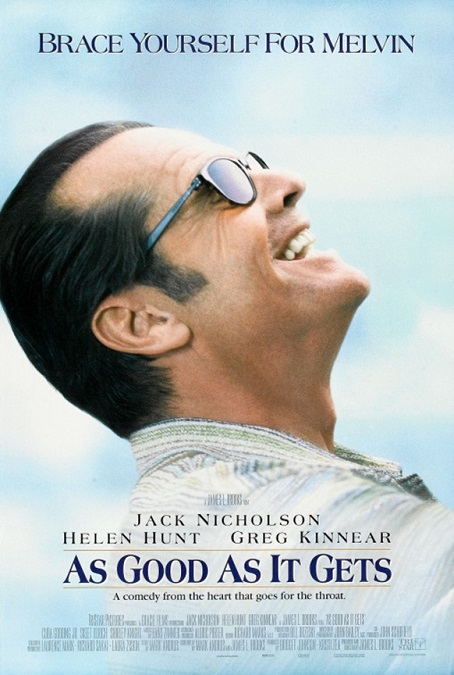
As Good As It Gets – 1997
This should have been an average movie, but it wasn’t. It was very good. It was a romantic comedy, a genre which tends to be light and fluffy with a formulaic and predictable plot. And I’ll admit, it did have a certain amount of predictability. But it was much deeper than it could have been and it kept throwing me curve-balls.
The male lead was a seriously messed-up character. He was racist, anti-Semitic, misogynistic, and had a severe mental disorder that caused him to live in his own world, to the complete exclusion of the world around him. The female lead was bitter and sarcastic. She had a chronically ill son whose care dominated her life and her emotional stability, to the exclusion of all else. And the supporting lead often seemed to be the only voice of reason when he wasn’t suicidal. He was a homosexual who had nearly been beaten to death. The loss of his physical beauty, his sense of self-worth, and his dignity destroyed his spirit. A romantic story using these characters should not have worked, but it did. It really did.
Jack Nicholson played Melvin Udall, a successful romance novelist with obsessive compulsive habits and a fear of change. Nearly every aspect of his life is based on ritual and repetition. He has an endless array of phobias and habits. He also has no filter on his mouth. Every morning he has to eat breakfast at the same place, sit at the same table, and get served by the same waitress. Helen Hunt plays Carol Connelly, Melvin’s waitress. She barely tolerates his cruel and insensitive behavior and comments. But she is a good woman, and does what she can to handle him.
Melvin’s gay neighbor, Simon Bishop, is played by Greg Kinnear. He is a successful painter who has the misfortune to hire Vincent, a street hustler played by Skeet Ulrich, as a model. Vincent’s criminal friends, break into his home to burglarize it. When he walks in on them, they beat him to a bloody pulp and run. When he awakes in the hospital, he is horrified at his reflection in the mirror.
There’s the set-up. The script was very cleverly written, intertwining the lives of the three people. Melvin and Carol seem like they couldn’t be more different, and the romance that blooms between them seems unlikely, but the on-screen chemistry between Nicholson and Hunt was undeniable. In fact, they both won Oscars for Best Actor and Best Actress for their roles, and I think they were well-deserved. I was particularly impressed with Hunt’s performance. The emotional range the role demanded of her was complex and deep. And Nicholson’s portrayal of the obsessive compulsive disorder was spot-on. And I have to also give special props to Kinnear, who also had to get through some emotionally powerful scenes.
And as I said, the plot was not stereotypically predictable. Even at the end of the movie when Melvin and Carol ended up together, I was still questioning whether their relationship would last past the end of the film. If their love was to work, two things would need to happen. Melvin would have to continue taking his medication and would have to completely change his attitude and behavior. Fortunately, this change is already happening, as he befriends Simon and rescues him by giving him a place to stay in his own apartment. And second, Carol will need to fully accept that Melvin has a mental illness that will never completely go away.
But ultimately, despite all the surprisingly heavy drama, the movie was a romantic comedy. A comedy. Right at the very beginning of the movie when Melvin throw’s Simon’s dog down a garbage chute for peeing in the apartment hallway, I was laughing. OK, it would have been animal abuse in real life. But in the movies, it was just hilarious. Of some of the off-the-wall and overtly offensive things that came out of Melvin’s mouth were shocking and funny. Ultimately, I liked the film because of the realness of the characters. Because I could see pieces of myself in each of them. The film’s director, James L. Brooks, did a great job. And the film’s script-writer, Mark Andrus, really knew his craft. Together, they created these wonderful characters that each had complete and well-developed arcs. By the end of the film, no matter where they started, they all became better people because of the newfound friendships and relationships that had blossomed between them.
And the dialogue was very well-written, with lines like “You make me want to be a better man,” or, “You’re why cavemen chiseled on walls,” or the movie’s big romantic climax where Melvin wins over Carol with a fantastic compliment, saying, “I might be the only person on the face of the earth that knows you’re the greatest woman on earth. I might be the only one who appreciates how amazing you are in every single thing you do, and how you are with Spencer, ‘Spence,’ and in every single thought that you have, and how you say what you mean, and how you almost always mean something that’s all about being straight and good. I think most people miss that about you, and I watch them, wondering how they can watch you bring their food and clear their tables, and never get that they just met the greatest woman alive. And the fact that I get it makes me feel good… about me.” How’s that for a compliment? Who wouldn’t respond to great lines like those?








